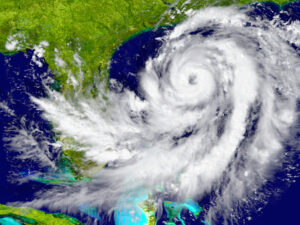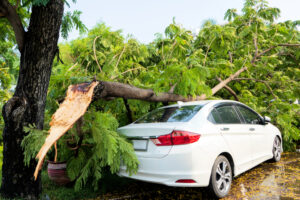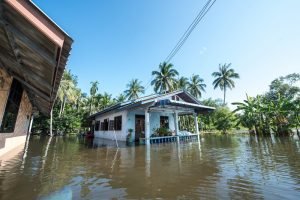Florida’s Unique Hurricane Insurance Policies and Adjuster Guidelines
Florida is a hotspot for hurricane activity particularly during the month of September. Residents and businesses often brace for impact during the Atlantic hurricane season which runs June through November every year. As a result, Florida’s hurricane insurance policies are uniquely structured to address the specific risks that these natural disasters pose.
Accredited claims adjusters play a vital role in assessing hurricane-related damages and ensuring that policyholders receive appropriate compensation. At Educational Services & Consulting (ESC), we understand the complexities of Florida’s insurance landscape and how crucial it is for adjusters to follow specific guidelines.

Understanding Florida's Hurricane Insurance Landscape
Florida’s is no “newbie” to hurricanes. Hurricane Andrew in the 90’s, Frances, Gene and Charlie in 2004, Michael in 2018, Irma in 2017, and Nicole in 2022 have all left their mark on Florida. The powerful winds, storm surges, and torrential rains from hurricanes can cause severe damage to homes, businesses, and public infrastructure across the state. Florida’s insurance policies are structured to address these risks and have specialized provisions for hurricanes that differ from general homeowner policies. It is imperative that property owners understand these differentiations and policy application.
Hurricane Deductibles
One of the most distinctive aspects of Florida’s hurricane insurance policies is the hurricane deductible. Unlike a standard deductible that applies to all types of damages, a hurricane deductible only kicks in after a hurricane causes damage. This deductible is usually calculated as a percentage of the insured value of the property, typically ranging from 1% to 5%. For instance, if a home is insured for $300,000 and has a 3% hurricane deductible, the policyholder would be responsible for the first $9,000 of hurricane-related damage. Though Florida has had hurricane deductibles for a number of years, many property owners are starting to see the percentage increase.
Accredited claims adjusters must clearly communicate these deductible details to policyholders, ensuring that they understand what portion of the damage they are responsible for before the insurance company’s coverage begins. Adjusters also need to know how to accurately apply these deductibles during claim assessments to avoid disputes or delays in compensation to property owners.
Windstorm Coverage
In Florida, windstorm damage caused by hurricanes is often covered under a separate policy or as part of the general homeowner’s policy with special provisions. Accredited adjusters need to assess wind damage carefully, as it includes everything from roof damage to broken windows and fallen trees. Wind damage is distinct from water damage, and understanding this distinction is crucial for an adjuster. For example, if a tree falls on a roof, the windstorm coverage applies, but if flooding occurs as a result of the storm, flood insurance may need to cover that aspect.
Flood Insurance
While wind damage may be covered under homeowners’ or windstorm policies, flood damage caused by storm surges or heavy rains often requires a separate flood insurance policy. In Florida, the National Flood Insurance Program (NFIP) provides most flood coverage, though some private insurers offer additional policies.
This separation between flood and windstorm coverage complicates the claims process. Accredited claims adjusters need to carefully assess whether damage was caused by wind or flooding, as this will determine which policy applies. The ability to distinguish between these types of damage is critical for ensuring that claims are processed correctly and that policyholders receive compensation through the appropriate channels.
To reiterate, the nuances of possible damaging acts in Florida, which may be simultaneous in occurrence, also means that adjusters must know which policies and deductibles apply to each type of damage.


Adjuster Guidelines for Assessing Hurricane Damage
Accredited claims adjusters in Florida must follow specific guidelines and protocols when assessing hurricane damage. These guidelines are in place to ensure that damage assessments are thorough, accurate, and aligned with the state’s insurance regulations.
1. Initial Assessment: The first step for any accredited adjuster is to conduct an initial on-site assessment of the property. This assessment should focus on documenting all visible damage caused by the hurricane. Adjusters should take extensive photographs and videos to capture the scope of the damage and prevent any disputes about the claim. This documentation is critical for comparing pre-storm and post-storm conditions.
2. Distinguishing Between Wind and Water Damage: As previously mentioned, one of the key challenges for Florida adjusters is distinguishing between wind and water damage. Adjusters must be trained to evaluate the direction of damage and signs of water intrusion versus wind damage. For example, if windows are broken due to flying debris, this would be classified as wind damage. However, if water entered through those broken windows and caused further damage, flood insurance may be required to cover the repairs.
3. Estimating Long-Term Effects: Hurricanes can cause both immediate and long-term damage. For instance, if a roof is compromised, water intrusion may not be immediately visible but could result in mold growth or structural weakening over time. Adjusters need to factor in these long-term effects when making their assessments, ensuring that the policyholder receives adequate compensation to address both immediate repairs and potential future issues.
4. Applying the Hurricane Deductible: As Florida policies often include a percentage-based hurricane deductible, adjusters must apply this deductible correctly. The adjuster needs to calculate the deductible based on the insured value of the property and subtract it from the total estimated damage. Explaining the application of the deductible to policyholders is also a key part of the adjuster’s role, as many may be unfamiliar with this aspect of their policy.
5. Ethical Considerations: Ethics are an essential part of the claims adjustment process. Adjusters must remain impartial, ensuring that their assessments are based solely on the facts of the damage. They must also comply with all state laws and insurance regulations, including prompt reporting and transparency with both the policyholder and the insurer.
The Importance of Proper Training for Accredited Adjusters
Florida’s hurricane insurance policies are complex, with unique features such as hurricane deductibles, windstorm coverage, and flood insurance. Accredited claims adjusters play a vital role in assessing damages and ensuring that policyholders receive fair compensation. By understanding the intricacies of these policies and following state guidelines, adjusters can provide accurate, efficient service in the wake of hurricanes. At ESC, we ensure that our adjusters are equipped with the knowledge and expertise to navigate these challenges, making them valuable assets during Florida’s hurricane season.
For more information on how to earn your 6-20 ACA designation and join this growing field, we invite you to call our Clermont, Florida office at 1-800-309-2549 or read more about the accredited claims adjuster certification process on our website (link to the page). Beyond our ACA courses, we have partnerships that allow our students to continue learning the proper ways to handle claims and continue to grow your career.
In Florida, once you earn your 6-20 accredited claims adjuster designation, you can apply to the state for your all-lines adjuster license. This will enable you to work on home insurance claims, auto and RV insurance claims, and property insurance claims. You would have the flexibility to work as a staff claims adjuster or an independent insurance adjuster.
Even if you move out of the state of Florida or your practice takes you out of state, Florida has a reciprocity agreement with other states within the U.S. Individuals who obtain their Florida license are eligible to work in 34 of the 37 states across the U.S. that require an adjuster license.
Ready to get started? Give us a call at 1-800-309-2549. We look forward to helping you!
